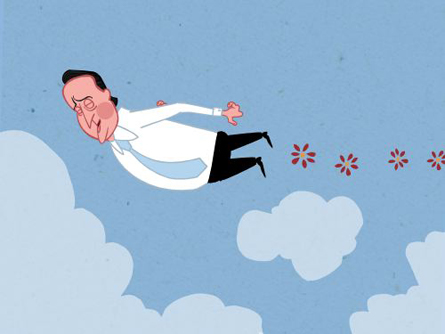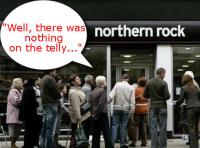Money Category
Money in the news and how you are going to pay and pay and pay
A New York Song For Goldman Sach Workers
GOLDMAN Sachs workers taunted in New York:
You know Merrill and Morgan and Lehman and Citi
J.P. and Wamu and Bofa and Barclay’s
But do you recall?
The most famous i-bank of all?
Goldman the two-faced i-bank
Gave out very shoddy loans
And if you ever saw them
You’d wonder how its profits rose
All of the other i-banks
Lost billions on the subprime game
How did that crooked Goldman
Come away with all the fame?
Because it knew how bad it was
And it stoked the flames
At the same time that it made bad loans
It bet that folks would lose their homes
Right now it’s bonus season
And we’re shouting “don’t you see!
Goldman the two-faced i-bank
Pay now or pay in history!”
Frosty the Goldman
Frosty the Goldman
Was a very crafty soul
With a gilded pipe and a lot of dough
And a heart made out of coal
Frosty the Goldman
Was too smart to lose they say
He made awful loans
But he sure did know
How to swindle us for pay
There must have been some magic
In that goldman pipe he smoked
For when he held it to his lips
He made bank and we went broke
Frosty the Goldman
Was as rich as rich can be
But still he’d say
“Make the poor folks pay!
And bring their homes right back to me”
Frosty the Goldman
Knew there had to be a way
To boost his funds
At the end of the run
On the backs of the subprime prey
He plundered and pillaged
Like a felon on the lam
Running here and there all around De Beers
Saying catch me if you can
He led us down the road to debt
And before the market dropped
He even bet we’d lose our homes
And now we holler STOP!
(thief!)
Frosty the Goldman
It is soon your bonus day
Stop telling us lies
We can rhyme “securitize”
And you sure as hell can pay
thumpety thump thump
thumpety thump thump
Look at Goldman go
thumpety thump thump
thumpety thump thump
Give up your dirty dough
Debt Drives Wife To ‘Use Ant-Freeze To Poison Husband’
DEBT: “A man was left deaf, blind and brain-damaged after his young wife spiked his drinks with antifreeze because she had run up debts and wanted to claim against his £50,000 life assurance policy, a court was told yesterday.
“Kate Knight, 28, set out to murder her husband, Lee, 37, after taking out bank loans and remortgaging the family home, Stafford Crown Court was told. She considered giving him an overdose of Ecstasy or iron tablets before settling on antifreeze, which contains the poisonous chemical ethylene glycol, it is alleged.”
Knight denies attempted murder. The trial continues.
Posted: 8th, January 2008 | In: Money | Comments (3)
Road Pricing Costs You
A LOOK at Road Pricing, with Dizzy:
Road pricing? Is it on? Is it off? Who actually knows? Some people might remeber that at Labour Conference, the Transport Secretary Ruth Kelly, said that road pricing was “inevitable”A month later it was reported that the Government had U-turned on the subject.
For a policy that is supposedly dead it’s interesting though that since 2004 the Department of Transport has spent “£6.5 million on consultancy contracts including professional advice on possible technical designs, system architecture and cost modelling” and that “[a]nother £1.0 million is currently contractually committed through to the end of 2007-08”.
Wouldn’t be anything to do with ITIS Holdings that company that has the former Transport minister, Stephen Ladyman, who bigged up road pricing, consulting for it now? Worth noting at this point though that former MP and London Mayoral candidate, Steve Norris is a non-executive director of ITIS. NOt sure how that sqaures with his opposition to road pricing but there you go.
The point is though is that the DfT is spending quite a lot of money on a policy that it has been applied will not be happening. On, off, on again? Or never really off, just postponed to the right politically expeident moment?
Britain’s Collection Plate Crisis
“CLERGY told to counsel on ‘life and debt’ crisis,” says the Times on its front page.
Given that the Church of England, whose national campaign this is, raises money by shaking a plate and selling old persons’ cakes, many may prefer to seek financial advise elsewhere…
Posted: 7th, January 2008 | In: Broadsheets, Money | Comment
Chinese Sweatshops Finger Breaks
HAVE a break. Have a KitKat. Or something Made in China: “Economists and politicians rant about China in terms of jobs lost, currency valuation, and trade gaps. But the New York Times reports that a new metric has been discovered: every year, Chinese workers manufacturing our toys, garments and electronic junk in the Peal River Delta collectively break 40,000 fingers.”
Tree Huggers Stung On Burt’s Bees
 BURT’S Bees has a “Mission” and a “Vision” – “We make people’s lives better every day — naturally.”
BURT’S Bees has a “Mission” and a “Vision” – “We make people’s lives better every day — naturally.”
It makes people’s life’s better by flogging them Thoroughly Therapeutic Honey & Bilberry Foot Creme, Healthy Healing Carrot Nutritive Body Lotion, Body Butter and anythign else you can smear on your arse and a piece of “raw” wholemeal bread.
Over on the Treehugger blog, readers learn:
“We and our readers were surprised and some were dismayed when Burt’s Bees was sold to Clorox for $913 Million in November; The New York Times reveals that all was not going so sweetly well before this, and that Burt got the short end of the stick. It seems that Burt was living in a turkey coop when he met Roxanne Quimby in 1984; they split in 1993 and she bought him out in 1999 with a house worth $ 130,000.
She then sold 80% of the company to AEA,(according to a commenter, a buyout firm formed in 1968 by the Rockefeller, Harriman, and Mellon families) in 2003 and got $ 141 million; when Burt complained she gave him $ 4 million. She got another $150 million when it was sold to Clorox; Burt got nothing. His face is on the packaging but he is back living in a turkey coop.
No little shock to discover that the product range is not hand processed by a beared old man with a festish for yellow and black jumpers. Perhaps users can dream anti-capitalism but putting a wiry grey hair in their pot of Super Shiny Grapefruit & Sugar Beet Shampoo…
Posted: 6th, January 2008 | In: Money | Comment (1)
Britain’s Living Standards Overtake USA
NOTES the Times: “LIVING standards in Britain are set to rise above those in America for the first time since the 19th century, according to a report by the respected Oxford Economics consultancy.
The calculations suggest that, measured by gross domestic product per capita, Britain can now hold its head up high in the economic stakes after more than a century of playing second fiddle to the Americans.
It says that GDP per head in Britain will be £23,500 this year, compared with £23,250 in America, reflecting not only the strength of the pound against the dollar but also the UK economy’s record run of growth and rising incomes going back to the early 1990s.
In those days, according to Oxford Economics, Britain’s GDP per capita was 34% below that in America, 33% less than in Germany and 26% lower than in France. Now, not only have average incomes crept above those in America but they are more than 8% above France (£21,700) and Germany (£21,665).
Hands up who can afford a new house….
Accepting Euros In New York
SO many Europeans in New York, euros are now accepted. The death of the dollar..?
Posted: 5th, January 2008 | In: Money | Comment (1)
More Expert Money Predictions
DOMINIC Lawson on money in the Independent:
“At the most grandiose end of this market in second sight are the forecasters of the big City investment banks. These are very respectable people with very respectable salaries. Last weekend’s Sunday Times Business section published a list of “2007’s Best Forecasters”. Perhaps the most significant single forecast that had been demanded of them was to predict what the Bank of England’s Base Rate would be at year-end. Of the “45 Best Forecasters” listed by The Sunday Times, how many do you think predicted the actual figure of 5.5 per cent? Not a single one of them – which might make you wonder what sort of crazy stuff The Sunday Times could have published if it had asked the 45 Worst Forecasters.”
If you knew wher the money was to be made, would you tell?
Posted: 2nd, January 2008 | In: Broadsheets, Money | Comment
Money Facts: Stamp Duty
ANORAK’S look at money news in the media
THE TELEGRAPH: “Home buyers in the South are paying more than three times as much stamp duty as those in the North of the country, new figures show.
“People buying a property in the South of the UK paid an average of £6,280 in stamp duty during 2006-07, while those in the North paid just £1,994 during the same period, according to online mortgage firm mform.co.uk.”
Astounding.
Anyone else think this is because homes in the south cost more than they do in the north?
Posted: 31st, December 2007 | In: Broadsheets, Money | Comment (1)
Credit Crunch: Art Booms, Shoppers Go Hell For Leather And Gloom
 CREDIT CRUNCH WATCH – Anorak’s look at mentions of credit crunch in the news
CREDIT CRUNCH WATCH – Anorak’s look at mentions of credit crunch in the news
DAILY TELEGRAPH: “Shoppers defy the credit crunch in sales chase”
A “stampede” in London’s Oxford Street. “However, retail experts said the bumper trading day – combined with the surprisingly buoyant few days before Christmas – would not be enough to stave off falling profits and even a raft of bankruptcies on the high street in the wake of the credit crunch”
SKY NEWS: “The Bank of England cut the cost of borrowing by 0.25% to 5.5% earlier this month, in an attempt to help shore up the economy in the wake of the global credit crunch”
DORSET ECHO: “FORGET the credit crunch – after just one day off, shoppers in Bournemouth hit the sales on Boxing Day to hand retailers a welcome post-Christmas bonus”
DAILY MAIL: “No end in sight to credit crunch – Any notion that the credit crunch will ease in the New Year was firmly dispelled by a double whammy of bleak news from across the Atlantic”
THE GUARDIAN: “The European economy is managing to stave off the impact of financial market turbulence, European Central Bank Governing Council member Guy Quaden was quoted as saying on Thursday. ‘The danger of a drying up of credit for the broader economy, the infamous credit crunch that some referred to at the start of the crisis, has not materialised’”
NISSAN Press Release: “Whether it’s coping with the credit crunch or the crunch of snow beneath your feet, Nissan has a range of deals to warm the cockles of your heart this winter”
DETROIT FREE PRESS: “What credit crisis? Art market booms”
CHANNEL 4: “Sales fever lifts credit crunch gloom – Scuffles broke out as sales fever began early at some stores before dawn, as the post-Christmas sales continue”
DAILY EXPRESS: “With the run-up to Christmas generally perceived as slow, many chains opened on Boxing Day hoping to attract shoppers amid signs of economic slowdown fuelled by the Northern Rock crisis and the global credit crunch. Despite growing fears in the City about the economy, the concerns are yet to filter down to consumers, with more than half saying they remain confident about their personal finances, a new poll revealed”
Pic: Via
Posted: 27th, December 2007 | In: Money | Comments (2)
Shoplifters Blame The Credit Crunch
 THE credit crunch is newspaper shorthand for anything that was once called “personal finance” or the even more esoteric “money”.
THE credit crunch is newspaper shorthand for anything that was once called “personal finance” or the even more esoteric “money”.
And because only political party fundraisers, the man from the Pru and people called Clive know anything about their money, the newspapers need to explain how money works it in BIG, EASY WORDS. The only issue sesem to be if subprime shod be subpirme, sub primne or the fenc sitting sub-prime.
Today, Telegraph readers are treated to “Affluent teens ‘steal gifts parents can’t afford’”.
Writes John Steele, Crime Correspondent: “The credit crunch is driving more and more middle-class children to shoplift expensive gifts denied them by their parents, a charity has warned.”
It’s not Armani’s fault she’s been pinched with a Swarkorski crystal-encased iPod in her jodhpurs but that of American money lenders.
If you must blame someone, blame New Century Financial – a major sub-prime lender in the US that has had its shares suspended on the New York Stock Exchange – and Billy Bob and Billy-Jean for dreaming of owning their own trailer…
Credit Card Charges Slashed And EU Moves Christmas To June 2008
 “CREDIT CARD CHARGES SLASHED,” says the Mail’s front page.
“CREDIT CARD CHARGES SLASHED,” says the Mail’s front page.
But the story is not about the cost of credit cards to users who fail to pay their balance in full. You need to read on to discover that the reduced costs are on for shops who accept payment by credit and debit cards.
Shops pay some of their revenues to the credit card companies for processing the transactions. To cover the cost, shops put their prices up.
And the headline making “SLASHED” costs might not come into force. The EU ruling relates to card authorisation charges “imposed on customers travelling to other EU member states”. The likes of Mastercard have been given six months to comply.
Says Brussels Competition Commissioner Neelie Koes, it’s “an early Christmas present to consumers”
British consumers should reap the benefits sometime in June, when they buy their groceries in Spain…
Hurrah!
Picture: Gawd Beless The EU – Poldraw
Northen Rock: Richard Branson’s Banking Licence
RICHARD Branson wants to buy Northern Rock:
The battle to sell stricken mortgage bank Northern Rock hit huge new difficulties this weekend when it emerged that favoured bidder Sir Richard Branson doesn’t have a banking licence.
Branson might be Santa after all…
Posted: 16th, December 2007 | In: Money | Comment (1)
How Much Property Space Do You Get For Your Money
 HOW much surface area does 50,000 euros (£36,000) buy you in…
HOW much surface area does 50,000 euros (£36,000) buy you in…
London is in between New York and Berlin – use your magnifying glass…
Hot Air And Whirling Arms: Gordon Brown And David Cameron Talk Energy
 MONEY Watch – Anorak’s daily look at money news in the papers
MONEY Watch – Anorak’s daily look at money news in the papers
THE GUARDIAN: “Carbon myths – Recycling and banning plastic bags are all very well, but they won’t save the planet. Instead, we should fly less, go vegan and insulate the loft, says Chris Goodall”
Politicians extol the virtues of domestic generation of electricity. The Conservatives and Liberal Democrats have committed themselves to paying us 45p a unit for electricity from the solar panels on our roof, about 10 times the wholesale price paid to the large, coal-fired Drax power station, in North Yorkshire. Microgeneration may be fashionable, but it is an astonishingly expensive way of reducing emissions. Less glamorous, but more effective, would be a plan to put a £20 note in the centre of every roll of loft insulation. British houses are the worst insulated in northern Europe and subsidised insulation would cut emissions far more cheaply than encouraging wind turbines or solar photovoltaic panels
THE TIMES front page: “Up on the roof – a power struggle”
Wind or sun? Should Britain be a land of little windmills or should we hope that global warming kicks in and our enemy the sun stops giving us cancer and instead makes enough juice for us to our TV,s PCs and SUVs?
Ladies and gentlemen, it’s Gordon Brown’s solar panels versus David Cameron’s wind turbine. It would take 100 years to recoup the £15,000 investment of Brown’s panels, and 60 years to make Cameron’s £ 3,100 turbine’s pay.
David Cameron has both panels and turbine. He may also have a hydro electric damn in the bath between the duck, the flannel and the clockwork mermaid.
Says Gordon Brown in “Did I ever think it would be fun? …well you can never get bored”: “Very quietly we have put solar panels on our home in Scotland quite some time ago. We have been operating with solar power for some time.”
Very quietly – and talked about in the pages of a national newspaper…
A Rank Night Out: Casino And Bingo
 “RANK loses as smoking ban bites,” reports the Daily Mail.
“RANK loses as smoking ban bites,” reports the Daily Mail.
The company behind Mecca Bingo and Grosvenor Casinos is not doing so well.
Why? Is it because punters would rather stay in and play online in the comfort of their own homes, rather than sat in some neon-lit, nylon carpeted throw-back?
Or is it because you cannot smoke in a bingo parlour or casino?
“The company behind Mecca Bingo and Grosvenor Casinos has been on the slide all year as the smoking ban and falling consumer confidence has taken a hefty toll on gambling revenues,” says the Mail.
Bingo halls are being sold off. Who buys them? “One sign of the times is that the buyers of the property have often been churches,” says the Mail. “They seem to be the ones with the money at the moment,” says chief executive Ian Burke.
More power to the religionists’ elbows in purging areas of the sink of vice and manmade fibres that is a bingo hall.
So is religion to blame for Rank’s misfortune, on top of the smoking ban?
Says the paper: “Rank now enters a tough Christmas period, when customers typically stay away from gambling shops and spend their cash on presents and food.”
Or they stay in and play casino games online. And you can smoke at home. We don’t advocate smoking as a rule, but if you want to, you can.
Play online and light up your life…
Posted: 12th, December 2007 | In: Money | Comment (1)
Credit Crunch: British Banks Go To ECB In Frankfurt
THERE’S been a bit of a puzzler in The City over the past few weeks. Yes, it’s all this credit crunch thing again. If, as we are told, banks aren’t lending to each other any more, if commercial paper isn’t getting rolled over (both of which are broadly true), then why aren’t the banks lining up to borrow from the Bank of England?
Because the thing is, if you’re a bank, you really do need to have the money. In the short term it doesn’t matter what you have to pay for it: you’ve simply got to have it and damn the price. If you don’t balance your books at the end of the day, if you don’t get the money from somewhere, then you’re bust, after all. Looks like we’ve found the answer:
EU sources say Britain’s banks have been clamouring for money in Frankfurt, accounting for a substantial chunk of the €190bn (£132bn) lent last week in the ECB’s variable tender operation. “It is fair to say they have been borrowing from the ECB on a very large scale. It’s cheap, so why not,” said one official.
…
“The money markets may look as if they are functioning again in Britain, but in reality they are not,” he said. Mr Redeker believes the key motive in going to Frankfurt is the certainty of secrecy, rather than the lower interest rate.“Nobody wants to take up the Bank of England’s three-month tender because of the stigma. They will be punished immediately by the markets,” he said.
While the Bank of England says it will not publish names, there are concerns that the British press will unearth the story somehow. It is safer to stick to Frankfurt, where the ECB does not even reveal the nationality of banks coming to the window – masking the picture.
The German press has reported that Barclays Capital in a major borrower at the ECB tenders. The bank has declined to comment.
While this may sound good, there’s no crisis because the banks are getting the money they need at a price they’re willing to pay, it does pose a larger problem for the future. At the moment, bank regulation and oversight, including the level of interest rates, is all to do with three parties. The Treasury, the Financial Services Authority and the Bank of England. Part of being able to oversee and control the wilder excesses of the banks is being able to control how much money they can get hold of and at what price: it’s the key way that interest rates are set, for example.
If the ECB is now acting as such a lender, it’s not so much that the BoE is independent, as claimed, as it is impotent.
Posted: 2nd, October 2007 | In: Money | Comments (2)
Credit Crunch: NetBank’s Poetic Justice
SO who are the real losers from the sub prime mortgage implosion and the consequent credit crunch?
Well, some good news I think from the USA. At least some of the losers have been people who should have known better and also who no one’s going to lose much sleep over.
As Felix Salmon points out, NetBank has just gone bust. Deposit insurance in the US covers only the first $100,000, so anyone with more than that will have to wait until the whole thing is closed down, the equipment down to the last mousepad sold off and all the debts paid: and then we’ll see if there’s anything left. But who was it that had a large deposit in said bank?
So Colthrust started a subprime lender, sold it, and then used the proceeds to start a company finding leads for other subprime lenders. He also put all his money in NetBank, which promptly went belly-up in the subprime meltdown. There’s some kind of poetic justice there, I think.
Couldn’t happen to a nicer group of people, don’t you think?
Posted: 2nd, October 2007 | In: Money | Comments (2)
Buy To Let Market Falls Into The Brown Stuff
LOOKS like the buy to let market in the UK is in freefall:
The buy-to-let market is in crisis as 40 per cent has been wiped off the value of new purpose-built investment properties in the past year, a survey by The Daily Telegraph has found. (…)
A study of nearly all the new-build flats that have come up for auction in recent weeks shows they are selling for, on average, just 60 per cent of what property investors paid for them.
While official figures suggest that the UK property market – including buy-to-let – is in fair health, there are growing numbers of new-build flats being repossessed in cities such as Manchester, Leeds, Birmingham, Norwich and Nottingham.
This isn’t, actually, quite what it looks like. Would you believe that it’s the Government at fault here (although those losing money shouldn’t be looking for any compensation of course)?
There’s been an insistence from Whitehall that new housing must be built (as far as possible) on brownfield land and to a high density. This has translated into local councils happily giving planning permission of developments of flats, and not so much, if at all, for houses. We’re thus seeing an excess of flats appearing on the market as opposed to the houses which we Brits traditionally prefer to live in.
Now whether it’s a good thing or not that we should all go and live in flats like Continentals is something quite different from the fact that if the new housing going up is the stuff that people don’t actually want to live in then the relative prices need to change.
This isn’t the housing market falling by 40%, nor is it the buy to let market falling by that much. It’s that the planners have approved more flats (and fewer houses) than the buyers actually want. So the price of flats is going down relative to the price of houses.
Posted: 1st, October 2007 | In: Broadsheets, Money | Comments (3)
Credit Cruch: The Beginning Of The End At UBS
 THE Credit Crunch. Says Tim: Yessssss! Result!
THE Credit Crunch. Says Tim: Yessssss! Result!
Seriously, this is excellent news:
The crisis in the troubled US sub-prime mortgage market has sent Swiss investment banking giant UBS tumbling to its first quarterly loss in almost a decade and prompted sweeping changes to senior management and significant job losses.
In a trading update, the Swiss lender said it will record a loss of up to SFr800m (£340m) for the third quarter thanks to “substantial losses” on investments relating to sub-prime mortgage assets.
It said that about 1500 employees will be made redundant by the end of the year.
No, I’m not exulting in fat cats getting the sack, hey, I’m not writing for The Guardian here. Rather, this is the beginning of the end for the credit crunch.
Remember back a few weeks when this all started? What everyone knew was that there were losses in those sub-prime loans. That wasn’t what caused the problems: what did was that no one knew where the losses were. The loans had been sliced and diced and then parked with investors all over the world and no one actually knew who was going to take a loss when John Doe was foreclosed upon. So no one would trade those loans nor would anyone lend using them as security. Thus the credit crunch.
Now we’re beginning to find out where those losses are. There’s been a couple of German regional banks going tits up and now we’re seeing the majors announcing their losses. Once we’ve got the whole reporting season over, we’ll know where the losses are, what the loans themselves are worth, and then, given that prices can be assigned to them, the loans will once again be traded and accepted as security.
Lots of people will have lost money, to be sure, but the credit crunch will be over.
Posted: 1st, October 2007 | In: Broadsheets, Money | Comment
Credit Cunch: Bank Of England Cheap Money for Business
 HOO boy, the knives are out for the Governor of the Bank of England at the moment, aren’t they? First there’s the Treasury and the Financial Services Authority (FSA) blaming him for the mess that Northern Rock got into…but hang about a bit, regulation is now the remit of the FSA. This is buck passing, not rational analysis. Then there’s this:
HOO boy, the knives are out for the Governor of the Bank of England at the moment, aren’t they? First there’s the Treasury and the Financial Services Authority (FSA) blaming him for the mess that Northern Rock got into…but hang about a bit, regulation is now the remit of the FSA. This is buck passing, not rational analysis. Then there’s this:
The Bank of England governor, Mervyn King, came under attack yesterday from Britain’s banks for his handling of the Northern Rock crisis as it emerged the central bank has increased its lending to the Newcastle-based bank to £8bn.
In a strongly worded attack, the British Bankers’ Association added to criticism from business leaders who said regulators were partly to blame for damaging confidence in the country’s financial system.
The BBA said it had warned of an impending collapse in the money markets months before the crisis hit Northern Rock. It said the crisis had also escalated following the Bank of England’s refusal to intervene with an injection of short-term capital into the money markets at discounted interest rates.
Hmm, well, which is the most important part of that statement? As the Cityunslicker points out:
Not so long ago we were reporting how Barclays and others were screaming for the Bank of England to pump liquidity into the system. Today the sorry tale went full circle: after much arm-twisting the BoE offered £ 10 billion of 3-month money to the markets at the ‘penal’ rate of 6.75 %. How penal is that ? Well, 3-month LIBOR peaked recently at around 6.7 %: so – not the kind of ‘penal’ interest-rate you and I recognize, (although obviously wholesale margins bear no resemblance to retail rates).
And how desperately was this liquidity needed ? yes, you guessed, not a single penny was taken. So – what the banks really wanted was a whole heap of cheap money. Now there’s a thing: we’d all have some of that!
Well, yes, it’s “discounted”. What a surprise, businessmen would like to get a subsidy from the taxpayers. My, how my heart bleeds for them when they don’t get it. As should yours, it’s your pocket they were trying to pick.
Posted: 28th, September 2007 | In: Money | Comments (2)
Credit Crunch: American House Prices Fall But Don’t Panic
 NEWS from across the pond on the credit crunch. House prices are going into free fall:
NEWS from across the pond on the credit crunch. House prices are going into free fall:
Sales of new homes in the US plunged in August at the fastest rate since modern records began, prompting fears the economy is sliding into a full-blown recession.
Total sales dropped 8.3pc on the month and are now down 21.2pc during the past year, a sign that the credit crunch has cut off mortgage funding for large numbers of people. JP Morgan now expects sales to fall by more than half from their peak before touching bottom well into next year.
This isn’t entirely a surprise. In fact, it’s not a surprise at all, it’s a blindingly obvious result of what’s been going on. The thing is that rising asset prices (and bubbles in them) and easy credit are not two different things. They’re actually cause and effect. Take away the easy credit and the asset price bubble will collapse. Not might but will.
Now before everyone goes out and puts not only their house but the dog kennel and the rabbit hutch on the market to beat this there are a couple of things different here in the UK.
Easy credit in the US came from two sources: low interest rates (for several years, real rates, ie after inflation, were negative) generally and also an expansion of the offering of credit to lower income groups.
Here in the UK we’ve only had the second of those two factors so any crash (yes, I know you won’t believe me) should be smaller. We also have an idiot planning system which prevents new housing from being built which will also shore up prices.
So far the advice is probably worry, but don’t panic.
Harrow Council’s Lie Detectors To Catch a Benefits Thief
THE BBC reports that lie detectors are being used by Harrow Council to try and catch out benefit cheats. Apart from the fact that lie detectors don’t actually work there’s a couple of other points at issue here, the most important of which is why do they get to test us?
Currently, they’re being used to try and deter people from claiming benefits to which they are not entitled which, in the grand scheme of things, is a very small problem indeed.
A few hundred thousand here or there, even the few £ billions that the whole benefit system leaks is a pittance compared with the £500 billion and rising that they take from us. So a far better use of this technology (for the moment we’ll accept their assurances that it works) is that we use it on them.
The vote stealers, those who tax us, should have their every public utterance filtered though these machines. When they say they’ll save the NHS, or improve education, then we’ll know when they’re lying and be able to prove it.
When it’s announced that the conker trees will have to come down in the name of elf ‘n’ safety, we’ll know, when we’re told that Britain’s place is in the heart of Europe, or that the Reform Treaty is very different from the rejected Constitution, oh my word yes, then the self-interested casuistry will be apparent to all.
There’s only really one problem I can see with this happy state of affairs. We don’t actually need any new technology to reveal the truth of these matters, we have a perfectly reasonable and usable one already. We are talking about politicians here, so knowing when they’re lying is quite simple: their lips are moving.
Posted: 27th, September 2007 | In: Money, Politicians | Comment (1)
Credit Crunch: Northern Rock Challenges Bank of England’s Independence
 AS Anatole Kaletsky points out in the Times today there’s one thing that will disappear (if in fact it ever existed) as a result of the credit crunch and the Northern Rock goings on: the Bank of England’s independence.
AS Anatole Kaletsky points out in the Times today there’s one thing that will disappear (if in fact it ever existed) as a result of the credit crunch and the Northern Rock goings on: the Bank of England’s independence.
It was, you may recall, almost the first thing Gordon Brown did on becoming Chancellor in 1997, making the BoE independently responsible for the setting of interest rates. They were given a target of 2% inflation and told to get on with it, as opposed to the earlier system when it was the Chancellor who actually decided the short term interest rates.
So far so very god but this independence took something of a knock when the Chancellor some years later changed the measure of inflation that that 2% target should hit. From one that included housing costs to one that did not….just as housing prices were climbing strongly and would have indicated that interest rates should rise. So, err, not all that independent then.
The current threat to such independence is that, given what has happened, perhaps the BoE shouldn’t be responsible for crisis management? If that is the case then the market dealings part would need to move to Treasury control.
But, the way that the BoE actualy controls interest rates is through those very market dealings. Meaning, in effect, that while the Bank would be responsible for interest rates, they couldn’t in fact do all that much about them.
Which leads to (and with the way that various politicians are talking about “interest rates should do this” “they should do that”) the thought that while Brown’s one and only universally agreed to be sensible act since 1997 might stay in name, the Bank of England’s independence is about to be taken away in substance.
Posted: 27th, September 2007 | In: Money | Comments (4)

